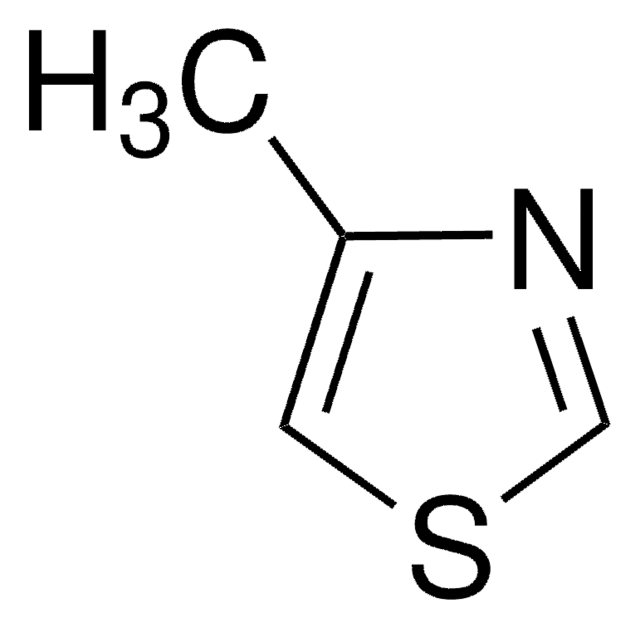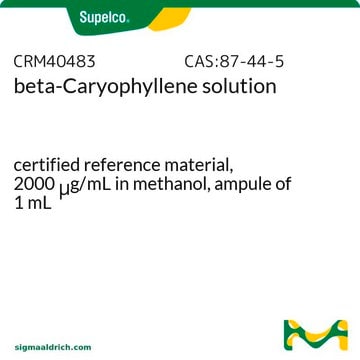W369608
6-Amyl-α-pyrone
≥96%, FG
Synonyme(s) :
5-Hydroxy-2,4-decadienoic acid γ-lactone
About This Item
Produits recommandés
Source biologique
synthetic
Niveau de qualité
Qualité
FG
Halal
Kosher
Conformité réglementaire
EU Regulation 1334/2008 & 178/2002
Pureté
≥96%
Indice de réfraction
n20/D 1.505 (lit.)
Densité
1.004 g/mL at 25 °C (lit.)
Application(s)
flavors and fragrances
Documentation
see Safety & Documentation for available documents
Allergène alimentaire
no known allergens
Propriétés organoleptiques
coconut; creamy; fatty; waxy
Chaîne SMILES
CCCCCC1=CC=CC(=O)O1
InChI
1S/C10H14O2/c1-2-3-4-6-9-7-5-8-10(11)12-9/h5,7-8H,2-4,6H2,1H3
Clé InChI
MAUFTTLGOUBZNA-UHFFFAOYSA-N
Catégories apparentées
Description générale
Application
- Demonstrating the Applicability of Proton Transfer Reaction Mass Spectrometry to Quantify Volatiles Emitted by the Mycoparasitic Fungus Trichoderma atroviride in Real Time: Monitoring of Trichoderma-Based Biopesticides.: This study showcases how Proton Transfer Reaction Mass Spectrometry can be used to monitor volatile organic compounds such as 6-Amyl-alpha-pyrone emitted by Trichoderma atroviride. The findings have significant implications for real-time monitoring and efficacy assessment of biopesticides, contributing to sustainable agriculture practices and biocontrol agent development (Ruzsanyi V et al., 2024).
- Chemotropism Assays for Plant Symbiosis and Mycoparasitism Related Compound Screening in Trichoderma atroviride.: 6-Amyl-alpha-pyrone is used as a standard in chemotropism assays, which are critical for screening compounds that facilitate plant symbiosis and mycoparasitism. This research is vital for identifying new bioactive compounds that can improve the interactions between beneficial fungi and host plants, advancing both agricultural and ecological research (Zeilinger S et al., 2020).
Mention d'avertissement
Warning
Mentions de danger
Conseils de prudence
Classification des risques
Eye Irrit. 2 - Skin Irrit. 2 - STOT SE 3
Organes cibles
Respiratory system
Code de la classe de stockage
10 - Combustible liquids
Classe de danger pour l'eau (WGK)
WGK 3
Point d'éclair (°F)
235.4 °F - closed cup
Point d'éclair (°C)
113 °C - closed cup
Équipement de protection individuelle
Eyeshields, Gloves, type ABEK (EN14387) respirator filter
Faites votre choix parmi les versions les plus récentes :
Déjà en possession de ce produit ?
Retrouvez la documentation relative aux produits que vous avez récemment achetés dans la Bibliothèque de documents.
Les clients ont également consulté
Notre équipe de scientifiques dispose d'une expérience dans tous les secteurs de la recherche, notamment en sciences de la vie, science des matériaux, synthèse chimique, chromatographie, analyse et dans de nombreux autres domaines..
Contacter notre Service technique















